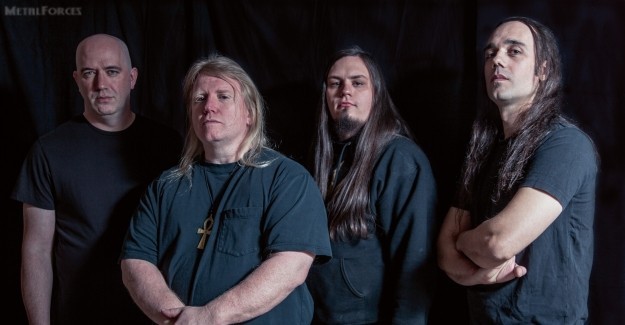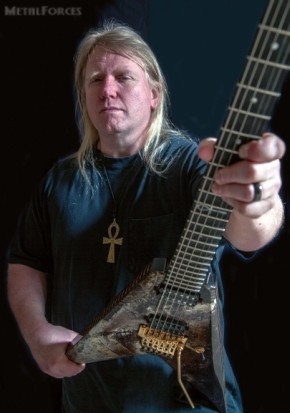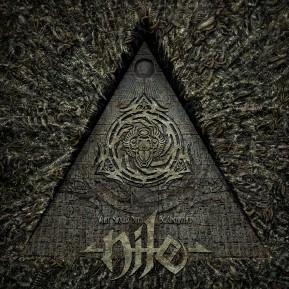
NILE – Age Of Feasting
Anthony Morgan
August 2015

|
![]()
The penning of compositions for August 2015 outing What Should Not Be Unearthed – the eighth full-length studio album from Greenville, South Carolina-based technical death metal outfit Nile – mirrored past writing sessions, the band subsequently cutting demos, performing the resultant tracks in the rehearsal space, and finally entering the recording studio.
“That much was the same, but I think this time we’re coming from a very different place,” notes Karl Sanders, vocalist, guitarist and founder of Nile. “I think these songs are very much focused on being heavy, catchy, memorable songs and technique be damned, which is kind of a blasphemous thing to say if you play what’s called technical death metal. So many times when I’m listening to this kind of metal, it seems the song gets put last. It’s always about this crazy drum / guitar thing, and blast-beats here, and fast guitars there, and often times the song kind of suffers because of it.”
Such comments suggest What Should Not Be Unearthed is a more simplistic effort by comparison. “I don’t know if you could call what we do simple, but I would say that the technical aspects are harnessed to serve a higher purpose which is the enjoyment of the listener,” the axeman clarifies. “Definitely I think there’s a focus on making the songs memorable, and not just a bunch of crazy stuff.”
Karl commented that ‘At The Gate Of Sethu (June 2012) and Ithyphallic (July 2007) – while full of incredible musicianship and unique songwriting approaches – were not ever intended to be definitive Nile records.’ “I really don’t think this one is probably meant to be the definitive Nile record, either,” he observes. “When I think of the definitive Nile album, I think of Catacombs (Amongst The Catacombs Of Nephren-Ka, April 1998) or In Their Darkened Shrines (August 2002), or Annihilation Of The Wicked (May 2005). Those are definitive Nile albums, where you could put them on and say ‘That’s everything that Nile is about.’ This album though, I don’t think it’s like that. I think it’s a Nile album, but it’s meant to be metal songs that are fun and meant to be enjoyable live.”
What Should Not Be Unearthed will inevitably be critiqued against past Nile offerings, although the singer wouldn’t compare the record to any previous jaunts. “In terms of sounds, this one is similar to Annihilation in that it has a very big, heavy type of sound; a big, huge and crushing guitar sound, and big, thick drums,” he begins. “I think that’s the reference point in terms of what it sounds like – the function of the mix, and so on. In that respect, yeah, but the writing is very different from Annihilation, for sure. As far as its heart and soul, I think this album is its own creature. I think it’s coming from a very different place compared to other Nile records.”
In crafting What Should Not Be Unearthed, there was a focus on ‘really brutal riffing’. “I think some things on Sethu were a little progressive technical musicianship-oriented, and not necessarily fan-friendly or meant to be understood by everybody,” Karl argues. “I think this record is meant to be understood, though. I would say this is a very accessible record. It is brutal and it’s heavy, but the songs are catchy, memorable and fun. You can put this record on and go ‘Oh, I get it. It’s a fucking metal song’ (laughs). I guarantee you that some of these songs will be live favourites, absolutely.”
That aforementioned focus was “kind of reactionary,” the axe-slinger reflects. “I think the last album was very much oriented towards the progressive musicianship, technique and playing things super clean, and a super-sterile kind of mix, and we didn’t want to do that again. We wanted to do something that was accessible to fans and was heavy, but people could listen to.”
Those who enjoy performing technically-minded music tend to be less interested when performing less technically-minded material. “I think it would be inaccurate to say that anything on this record is necessarily simpler or easier to play,” Karl cautions. “It’s more accurate to say that the technique has been harnessed for use by a higher power. The criteria for the riffing and the musicianship on this record was merely that it be heavy and have the metal spirit, whether it was fast or slow or tricky or not tricky. Moreso, it was whether it helped the songs; whether it was a part of contributing towards the greater purpose of the song. By that token, there’s some pretty intelligent stuff on this record.
“George Kollias calls the title track one of the hardest, most difficult Nile songs he’s ever played. He doesn’t make stuff up, or speak lightly. George is a drummer with a lot of respect, and he takes that aspect seriously. If George says it’s tough to play, then it’s fucking tough to play (laughs). I think the point is there are things on this album that are difficult to play, but it’s harnessed to make catchy and memorable songs.”

|
Inaugurating proceedings is the track ‘Call To Destruction’. “I guess the first song on the record – ‘Call To Destruction’ – is about a couple of years back when Islamic extremists were calling for the destruction of the pyramids,” the frontman informs. “They were demanding that since the pyramids were obviously built before the time of Mohammed, they were therefore Pagan and blasphemous and must be destroyed, which of course is completely ridiculous. We wrote a metal song about it. ‘Let’s tear down the pyramids’. It’s quite ridiculous and fun. ‘All pyramids must be torn down’ (laughs).
“I’m just approving a radio edit of that as the first single. Yeah, the ‘Call To Destruction’ song, they wanted it as a single. For this magazine though, it seems they want to chop like a minute of it out, and they’ve got like several different versions of what is to be chopped out – apparently, there’s a five-minute time restriction on this magazine compilation. I’m supposed to make a decision on that. How do you decide that? It’s like deciding which part of your body you wanna chop off. ‘Will it be the leg? The hand? The knee? Maybe your head?’ ‘Yeah, let’s chop off the head and call it the same song. Why not?’ That’s the music business, my friend. It’s all daft. It’s like going out with your girlfriend, and she says ‘Hey, you can only fit seven inches in here. That other couple… Well, you’ll have to put your hand down there.’ That ain’t no fun. What fun is that?”
As is customary for Nile, lyrical meanderings occupy the ancient Egyptian and archaeological realm. “There’s one song called ‘Evil To Cast Out Evil’, which is about calling upon Pazuzu to protect us from ancient swarms of locusts back in the day,” Karl shares. “There’s another song called ‘Age Of Famine’, and that’s about the mega-drought and famine that brought about the demise of the old kingdom. Another one that comes to mind is ‘To Walk Forth From Flames Unscathed’, which is an Egyptian spell to protect oneself from being burnt up in flames in the afterlife. ‘What Should Not Be Unearthed’ refers to digging up stuff which should not be dug up, stuff that would be better off if people just left it in the earth.”
The title track’s lyrical fare recalls The Mummy slate of horror movies, most famously adapted by the likes of Universal and Hammer. “Yes, absolutely,” the mainman agrees. “You hit the nail perfectly on the head. That’s exactly what this is like; the old-fashioned movies where it’s better not to disturb the thing that’s been sleeping for a thousand years.”
Wholly entering upon ancient Egyptian as well as archaeologically themed lyrics, some might assume it becomes more and more difficult to pen said lyrics with each subsequent full-length. “No, it doesn’t,” Karl reckons. “I think every year, it becomes a little bit easier because it’s a learning and a craft process with songwriting. It’s definitely not harder and harder. I think some of the earlier albums were very difficult to write because it was something very new that no-one else had done, and we’re kind of blazing our own path.”
Ancient Egyptian as well as archaeological themes have been carried through to eight studio records to date. “I had never planned on making eight Nile albums when we started,” the lyricist chuckles. “When we started, there was no thought of that. We were living each day one day at a time. When we made Amongst The Catacombs Of Nephren-Ka, we figured that that might be the only album that we ever got to make. We’ve always kind of taken the approach ‘What if this were the last record we got to make?’ Tomorrow’s not promised; fucking Ayatollah Khomeini might declare it’s time for us all to be burnt up in an atomic nuclear holocaust.”
Recording sessions were mainly handled at Karl’s own Serpent Headed Studios. “I have a typical rack of studio mike pre-amps and compressors, and patchbays and effects units,” he lists. “I’m running some Event Opal monitors, some Tannoy monitors, and I’m running quite a ridiculously expensive computer with a twelve-core processor. It has 64 gigabytes of ram, and just an insane amount of hard drive space. I’m pretty well equipped here; I’ve got a couple of nice microphones. I’ve got a really nice Manley Core preamp, I’ve got an SSL preamp, I’ve got a rack of dbx preamps. It’s quite thorough.
“When you own your own studio, you’re not constrained by worrying about the clock ticking and how many hours because you can work as many hours as you like, and I for one like to work long hours. The clock ticking is always a concern when you’re recording an album. You’re trying to hurry up and get it done, and often times you make one little compromise after another in order to get it done as quickly as you can because time is money. When you’re recording at your own place though, you don’t have to worry about the clock. You just make music, and however long it takes is how long it takes.”
Recording there, the musician as well as fellow vocalist and guitarist Dallas Toler-Wade had a specific aim in mind. “I think on this record, you’ll find that there’s a very high standard of musicianship certainly which you’ve come to expect from Nile over the years, but it’s all been harnessed for a higher power, and that’s making memorable and catchy songs,” he reiterates. “If it’s not fun to listen to, then why should we listen to it. As much amazing technical death metal is out there nowadays, if it’s not enjoyable to listen to then what are we doing? I believe in letting your work speak for itself. Hopefully people will hear this album and enjoy it, and there you go. The circle of metal is complete.”
The pair additionally oversaw production. “Production decisions were made by Dallas and I,” Karl tells. “This time we wanted to make sure it got done the way we wanted it to get done. You can tell somebody all day long what you want them to do with your record. At the end of the day, if you handed your record over to somebody else to mix and produce, then you’re at their mercy. I thought At The Gate Of Sethu was too thin for example, especially given how clean it is. It’s surgically clean, so I think it needed a little more warmth to be listenable. It just didn’t have the warmth it needed. This time, we definitely wanted a big, fat, heavy, crushing sound, so we were determined to get it. No-one or anything was getting in our way.

|
George handled the initial tracking of drums at Soundlab in Columbia, South Carolina with Bob Moore, meanwhile. “We like doing drums with Bob Moore,” the guitarist enthuses. “Bob really knows how to mike a drum set, like where to put the drum mikes. He does a really, really good job. We really like working with Bob.”
In discussing What Should Not Be Unearthed, Karl stated: ‘Overall, though, I can say that this time around the recording/composing/rehearsing was a rewarding and enjoyable experience, and the band worked together as a team with a level of consistence and confidence in a way I’ve not seen since the golden early years of working with original Nile drummer Pete Hammoura.’
“I think this time, there was a spirit of teamwork,” he views. “Often times, when records are difficult records to make, there’s a higher level of stress and relationships get strained. Sometimes the pressure is high and the stress is high, and sometimes it’s soul-destroying. Sometimes it can really do damage to your mental health. With this record though, we had a lot of fun making it. I remember Dallas and I working on this record, and laughing and having fun, and doing the work, and really enjoying it. At one point, we said to each other ‘This is the most fun we have ever had – ever – making a record.’ We’re pretty happy about that.”
Mixing responsibilities were overseen by Neil Kernon. “Neil is a great fucking guy, man,” the vocalist endorses. “He’s done over 500 records. He’s actually won several Grammys for his work. He’s a great fella to work with. He’s a Londoner. He’s a funny guy too, man. He knows every single Monty Python routine ever.”
Cover artwork duties fell to Michel ‘Xaay’ Loranc. “You may remember Xaay from the Those Whom The Gods Detest album cover (November 2009),” Karl reminds. “We really wanted to work with Xaay again this time. He’s a fun guy to work with, and he does amazing stuff. He’s done a website for years. Yeah, absolutely. It’s a very cool album cover. We let him do whatever he wanted. I sent him the lyrics to the song, wrote a few paragraphs about what the song is about, and he took it from there. All the ideas were his.”
A music video to promote What Should Not Be Unearthed’s issue in the works. “I’m sure we’ll make some kind of video for this record,” the axeman confirms. “We make one for every record, so why not this one? I already know which song I’d like to do. Curiously enough, I got a Facebook message from Nergal of Behemoth the other day, and he suggested the exact same one that I had picked as a single. It’s called ‘Evil To Cast Out Evil’.”
What Should Not Be Unearthed was released on August 28th, 2015 via Nuclear Blast Records.
Interview published in August 2015.
Related Posts via Categories
- SCOTTISH SICKNESS – A Report On The Scottish Death Metal Scene, Featuring BRAINBATH, PUTRID FATE And RANCID CADAVER (October 2022) | Features / Interviews @ Metal Forces
- LARVAE – Join The Hardcore Cult! (June 2022) | Features / Interviews @ Metal Forces Magazine
- TRENCH FOOT – Sacrificing Morals For Gory Obscenities (June 2022) | Features / Interviews @ Metal Forces Magazine
- L.A. GUNS – Trigger Happy (March 2019) | Features / Interviews @ Metal Forces Magazine
- CANCER – Crimes So Evil (November 2018) | Features / Interviews @ Metal Forces Magazine
- U.D.O. – The Tank Drives On (August 2018) | Features / Interviews @ Metal Forces Magazine
- SIEGE OF POWER – Bleeding For The Cause (August 2018) | Features / Interviews @ Metal Forces Magazine
- MOONSPELL – A Taste Of Live Eternity (August 2018) | Features / Interviews @ Metal Forces Magazine
- MONSTROSITY – Dark Matter Invocation (August 2018) | Features / Interviews @ Metal Forces Magazine
- SATAN – Five Magicians (August 2018) | Features / Interviews @ Metal Forces Magazine
|
|





